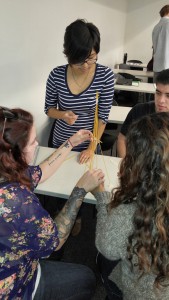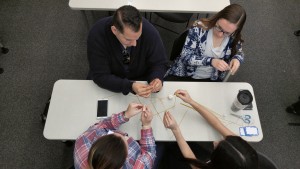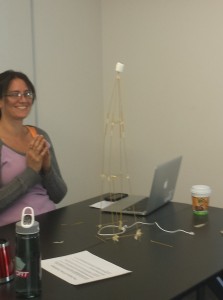Day 1 of the Interdisciplinary Research Learning Community (IRLC) focused on building marshmallow towers. The marshmallow challenge gives students 18 minutes to create the tallest possible tower–using 20 pieces of uncooked spaghetti, one yard of string, and one yard of masking tape– that can hold a  single marshmallow aloft without human support.
single marshmallow aloft without human support.
Studies show that business executives do the worst job with this challenge, while kindergarten students perform the best. Scholars who study marshmallow tower construction suggest that the success of young children is owed to their willingness to proceed on a trial-and-error basis, allowing for mistakes and mid-course corrections. Executives plan and, if the plan fails, have little to no time to adjust their strategy.
The challenge is an apt metaphor for the research process.
Compared to CEOs and Kindergartners our students did well. All four groups were able to create a tower (not all groups can). Each group built a tower of more than 20 inches (better than the CEOs on average, less than the 30+ inches of the Kindergarteners), and the winning groups (there was a tie) held the marshmallow 27 inches above the surface of the table.
The marshmallow challenge is a fun icebreaker. But it is also an apt metaphor for the nature of the research and creative processes students are engaged in.











